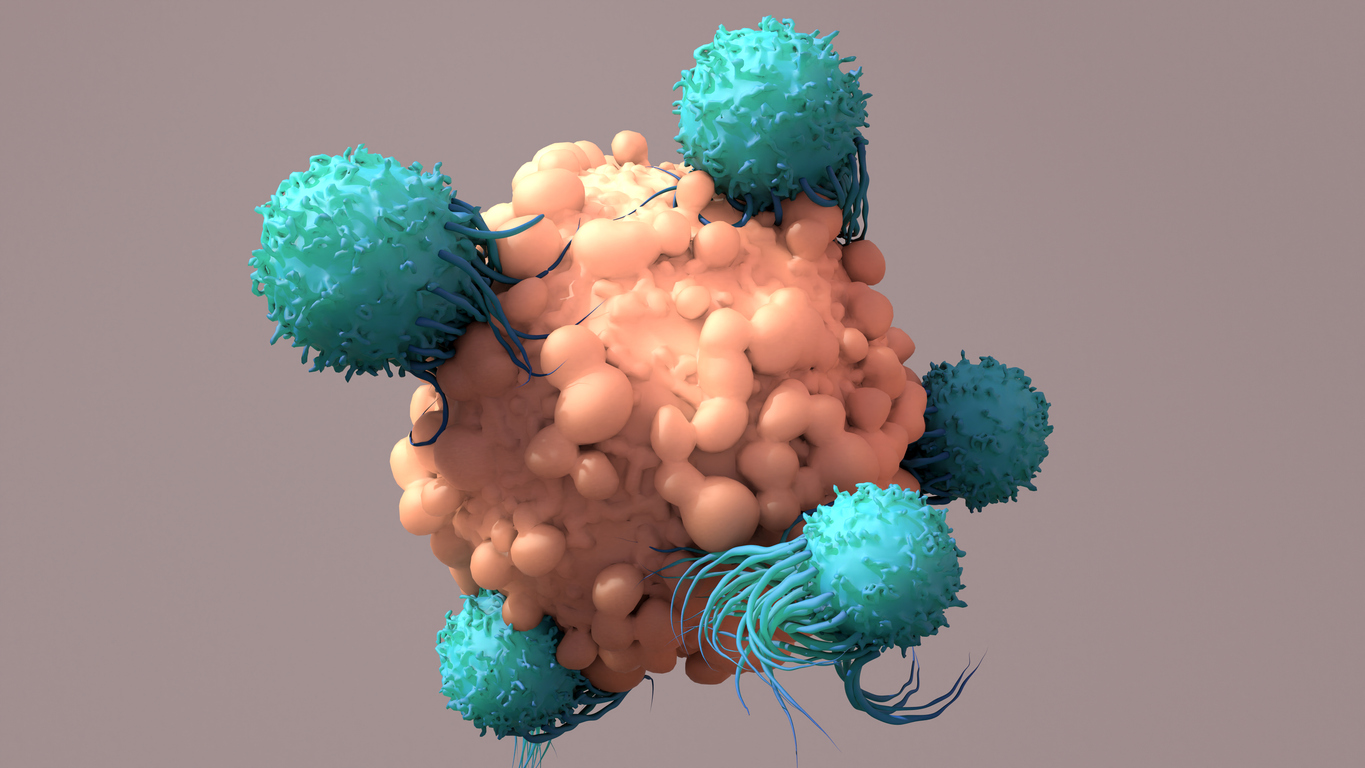2025-10-22
TNBC after chemotherapy: can immunotherapy change the game?
Oncology
By Ana Espino | Published on October 22, 2025 | 3 min read
Triple-negative breast cancer (TNBC), characterized by the absence of hormonal receptors and HER2 expression, accounts for approximately 15–20% of all breast cancer cases. It is associated with a high risk of recurrence and early metastasis. Among patients who present with residual invasive disease after neoadjuvant chemotherapy, the prognosis is particularly poor.
Currently, capecitabine remains the standard adjuvant therapy for these high-risk patients. However, several questions persist regarding the optimal post-neoadjuvant strategy, particularly for those who do not achieve a pathologic complete response (non-pCR). Strengthening adjuvant treatment in this critical phase — while focusing on high-risk patients who fail to respond completely to initial therapy — is therefore a major therapeutic challenge.
In this context, the MIRINAE trial (KCSG-BR18-21) was launched to determine whether adding an immune checkpoint inhibitor (atezolizumab) to capecitabine could improve invasive disease-free survival (IDFS) in this high-risk population.
The MIRINAE study is a randomized phase II trial designed to compare the efficacy of atezolizumab plus capecitabine versus capecitabine alone as adjuvant therapy in patients with triple-negative breast cancer (TNBC) who have residual invasive disease after neoadjuvant chemotherapy.
Although final survival data (IDFS, DRFS, OS) are not yet available, the trial enrolled 284 patients and incorporates a comprehensive biomarker analysis, including tumor-infiltrating lymphocytes (TILs), tumor mutational burden (TMB), and gene expression profiles.
This protocol aims to determine whether adding an immune checkpoint inhibitor can improve clinical outcomes in this high-risk, non-pCR TNBC population. While awaiting long-term follow-up results, the study already lays the groundwork for a potentially transformative, personalized post-neoadjuvant approach in TNBC.
Triple-negative breast cancer with residual disease after neoadjuvant chemotherapy remains a high-risk subtype with limited adjuvant options. The key challenge is to enhance recurrence-free survival without increasing treatment-related toxicity. The MIRINAE trial was therefore designed to evaluate the added value of atezolizumab (immunotherapy) combined with capecitabine in the adjuvant setting. Although the final clinical outcomes have not yet been published, this approach may strengthen antitumor activity by engaging the post-neoadjuvant immune microenvironment.
About the author – Ana Espino
As a scientific writer, Ana is passionate about bridging the gap between research and real-world impact. With expertise in immunology, virology, oncology, and clinical studies, she makes complex science clear and accessible. Her mission: to accelerate knowledge sharing and empower evidence-based decisions through impactful communication.
Triple-negative breast cancer (TNBC), characterized by the absence of hormonal receptors and HER2 expression, accounts for approximately 15–20% of all breast cancer cases. It is associated with a high risk of recurrence and early metastasis. Among patients who present with residual invasive disease after neoadjuvant chemotherapy, the prognosis is particularly poor.
Currently, capecitabine remains the standard adjuvant therapy for these high-risk patients. However, several questions persist regarding the optimal post-neoadjuvant strategy, particularly for those who do not achieve a pathologic complete response (non-pCR). Strengthening adjuvant treatment in this critical phase — while focusing on high-risk patients who fail to respond completely to initial therapy — is therefore a major therapeutic challenge.
In this context, the MIRINAE trial (KCSG-BR18-21) was launched to determine whether adding an immune checkpoint inhibitor (atezolizumab) to capecitabine could improve invasive disease-free survival (IDFS) in this high-risk population.
Atezolizumab + Capecitabine: winning combination or false promise?
The MIRINAE study is a randomized phase II trial designed to compare the efficacy of atezolizumab plus capecitabine versus capecitabine alone as adjuvant therapy in patients with triple-negative breast cancer (TNBC) who have residual invasive disease after neoadjuvant chemotherapy.
Although final survival data (IDFS, DRFS, OS) are not yet available, the trial enrolled 284 patients and incorporates a comprehensive biomarker analysis, including tumor-infiltrating lymphocytes (TILs), tumor mutational burden (TMB), and gene expression profiles.
This protocol aims to determine whether adding an immune checkpoint inhibitor can improve clinical outcomes in this high-risk, non-pCR TNBC population. While awaiting long-term follow-up results, the study already lays the groundwork for a potentially transformative, personalized post-neoadjuvant approach in TNBC.
A future standard in the making?
Triple-negative breast cancer with residual disease after neoadjuvant chemotherapy remains a high-risk subtype with limited adjuvant options. The key challenge is to enhance recurrence-free survival without increasing treatment-related toxicity. The MIRINAE trial was therefore designed to evaluate the added value of atezolizumab (immunotherapy) combined with capecitabine in the adjuvant setting. Although the final clinical outcomes have not yet been published, this approach may strengthen antitumor activity by engaging the post-neoadjuvant immune microenvironment.
However, the limitations of this study remain and justify further research. These future studies will include larger-scale trials, a more detailed analysis of PD-L1–positive subgroups, and the development of predictive biomarkers for response to adjuvant immunotherapy. They will also need to explore optimal therapeutic sequences and the integration of new combinations, with the goal of achieving a personalized treatment approach for residual TNBC.
Read next: TNBC: could everything be happening in the mitochondria?
About the author – Ana Espino
PhD in Immunology, specialized in Virology

Last press reviews
Leprosy: a disease still beyond control

By Ana Espino | Published on January 22, 2026 | 3 min read...
Parental alcohol intoxication: the hidden impact on children’s mental health

By Carolina Lima | Published on January 19, 2026 | 3 min read
